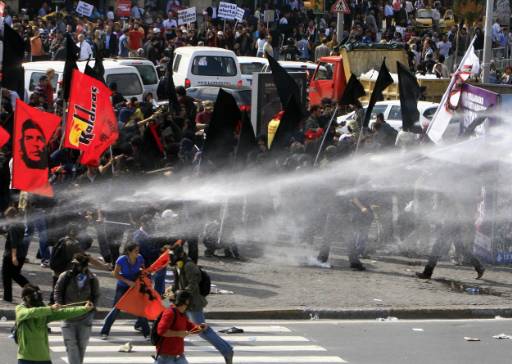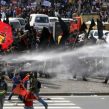
Turkish Opposition to the IMF Appears Ideological
Publication: Eurasia Daily Monitor Volume: 6 Issue: 185
By:

The IMF and World Bank annual summit in Istanbul have ended after seven days of meetings and seminars. During the meetings the policy-steering International Monetary and Financial Committee (IMFC), asked the IMF to address four key reform areas –the IMF’s mandate, its financing role, multilateral surveillance and governance. Their decisions comprise:
1. A review of the mandate of the IMF, to encompass the whole range of macroeconomic and financial sector policies that affect global stability.
2. An assessing of how to build on the success of the Flexible Credit Line and provide insurance to more countries as the lender of last resort.
3. An evaluation of whether the fund’s enhanced financing instruments, such as the Flexible Credit Line, could help address the question of global imbalances by reducing the need for countries to self-insure against crisis by building up large reserves.
4. The IMFC endorsed the G20 proposal for the IMF to help with their mutual assessment of policies. This represents a new type of multilateral surveillance for the IMF.
5. An endorsement by the panel of a recent step forward on the governance front agreed by the G20. This will shift quota shares toward dynamic emerging markets and developing countries by at least 5 percent from the over-represented to under-represented countries, by January 2011 (www.imf.org, October 6).
It appears that the legitimacy of the world economic structure has faced challenges on two fronts. First, the protestors outside the Congress Valley in Istanbul were questioning the legitimacy of the IMF and World Bank system as a whole. Around 5,000 protesters gathered in Taksim Square to protest against the annual meetings of the IMF and World Bank. Some trade union confederations and professional chambers organized the gathering, while a wide range of leftist groups participated in the protest. As the protestors attempted to enter the Congress Valley, police confronted the group attempting to provoke violence. The ensuing clashes spread to side streets with small groups of protesters using slingshots and Molotov cocktails. Police also used tear gas and water cannons to disperse the groups. The demonstrations continued until the end of the meetings (Hurriyet Daily News, October 7).
The most important challenge to the IMF-led economic model came from within the system itself. The representatives of developing countries raised the legitimacy issue which the fund has to overcome in order to be a trusted reserve pool. Economists emphasized that officials from emerging economies wanted assurances that any shift in voting power at the Washington-based IMF will continue in their favor. Germany has 5.9 percent of the votes at the IMF and China has just 3.7 percent, even though China is now a larger economy. On October 5 the Mexican Central Bank Governor Guillermo Ortiz said in Istanbul that he is concerned that “legitimacy” is “not likely to happen anytime soon.” His Brazilian counterpart Henrique Meirelles said on the previous day that “self-insurance works better.” “The IMF is accountable to its shareholders and that is going to be an issue for Dominique Strauss-Kahn [the Managing Director of the IMF],” explained the economist Joseph Stiglitz in an interview in Istanbul (Hurriyet Daily News, October 7).
The Turkish Prime Minister Recep Tayyip Erdogan supported the argument advanced by developing countries by saying: “To have a better world we should cooperate to find solutions for the regions that are underdeveloped. We should listen to those who are now protesting against us outside this hall” (Radikal, October 6). Initially, the Turkish press argued that Erdogan was alone in his criticism of the world economic model. However, as the debates intensified in the Congress Center it became clear that Ankara supports the argument that has been developed by the world emerging markets. On the following day, the Turkish Economy Minister Ali Babacan, stressed that Ankara welcomed the decision to shift quota shares toward dynamic emerging markets and developing countries by at least 5 percent from the over-represented to under-represented countries by January 2011. Babacan stated that with the increased quota share and its economic performance Turkey is becoming a world class economy that will have a greater future role in the world economy (NTV, October 8).
With Erdogan and Babacan’s statements it appears that Ankara’s opposition to the IMF standby agreement is not simply rooted in technical reasons, but it also exposes principled differences. Unlike Brazil, China or other developing countries, Turkish economic recovery since 2001 is linked to IMF economic programs. In addition, as it implements E.U. reforms Turkish economic development is closely tied to promoting trust among the international business community. If the E.U. membership process is one pillar that provides such insurance for the Turkish economy, the credit pillar provided by the IMF approved economic program is also important. Thus, it will be interesting to see where Turkey’s opposition to the IMF might end.




